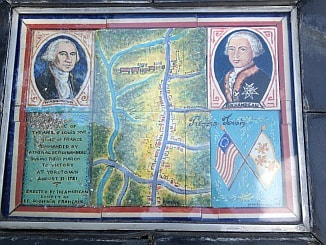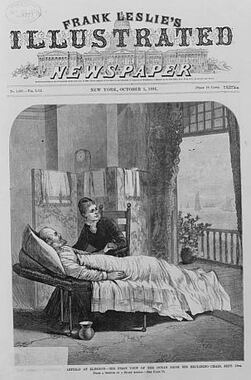-- New Jersey History Timeline - September
* January * February * March * April * May
* June * July * August * September
* October * November * December
* January * February * March * April * May
* June * July * August * September
* October * November * December
|
** Home
* History * Population * Government * Government Services * Politics * Lobbyists * Taxes * State Symbols * Biographies * Economy * Employers * Growth Companies * Venture Capital * Law Firms * Labor Unions * Jobs * Real Estate * Transportation * Education * State Colleges * Associations * Charities * Recreation * Restaurants * Hotels * Health * Hospital Ratings * Environment * Stadiums/Teams * Theaters * Historic Villages * Historic homes * Battlefields/Military * Lighthouses * Art Museums * History Museums * Wildlife * Climate * Zoos/Aquariums * Equestrian centers * Beaches New! * National Parks New! * State Parks New! * Amusement Parks New! * Waterparks New! * Swimming holes New! * Arboretums New! * Tuition Comparisons New! * Kids Attractions More... * Gallery of images and videos * Fast Facts on key topics * Timeline of dates and events * Anthology of quotes, comments and jokes * E-books digital publications * Book Store of NJ books * Links to other resources * Social media * NJ Presidential Quiz * Opinion |
On September 1 of 1781 After joining together on August 29, French forces commanded by General Jean Baptiste de Rochambeau and Continental Army under George Washington break camp in Princeton to march south on their way to Yorktown, Virginia. With the aid of the French fleet, their combined armies would trap the British under the command of General Lord Charles Cornwallis and force his surrender on October 19.
On September 3 of 1783 The Second Treaty of Paris is signed, ending the Revolutionary War. At the time of the signing, the Continental Congress was meeting in Princeton, with George Washington, his wife Martha and his senior officers residing a few miles away in what is now the borough of Rocky Hill. The Congress had relocated to Princeton in June after mutinous soldiers had come to Philadelphia demanding back pay and discharges from service and the Congress was displeased with what it viewed as the failure of Pennsylvania to provide adequate security against the mutineers. The Congress would not learn of the details of the Treaty, however, until the end of October, then adjourning their session in Princeton on November 4 and reconvening in Annapolis on November 26. On September 4 of 1949 A riot following a benefit concert near Peekskill, New York, which featured Rutgers graduate and Princeton native Paul Robeson, leaves 140 injured. The riot pitted those protesting Robeson, an African American, for his activism for civil rights and socialist causes against his supporters gathered to raise money for the Civil Rights Congress. 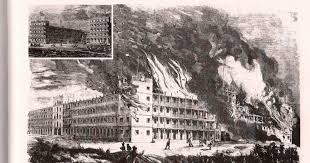
On September 5 of 1856 A fire believed to be the result of arson destroys the still unfinished Mount Vernon Hotel in Cape May--designed to be the largest resort hotel in the world at the time which could lodge 2,100 guests in over 430 rooms.. Six people die in the fire, one of the two proprietors, four of his children and a housekeeper. On September 6 of 1949
Howard Unruh, a 28-year-old Army veteran, kills 13 people (including three children) during a 12-minute walk through his neighborhood in Camden. Unruh was found to be criminally insane, and confined to the Vroom Building for the Criminally Insane near Trenton until he dies in 2009 at the age of 88. 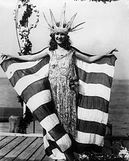
On September 7 of 1921 A two-day "bathing beauty revue" begins in Atlantic City, concluding with 16-year-old Margaret Gorman, Miss District of Columbia, declared "The Most Beautiful Bathing Girl in America." In the following year, she is recognized as the first "Miss America" when she returns to compete. |
On September 7 of 1984
Robert O. Marshall of Toms River, an insurance broker and chairman of the Ocean County Chapter of the United Way fund, and his wife Maria, traveling north late at night on the Garden State Parkway from Harrah's in Atlantic City when, according to Marshall, he claimed that when he and his wife pulled over at the Oyster Creek rest stop in Lacey Township, they were accosted by two men. Marshall alleged that he was then knocked unconscious by a blow to the back of his head, and approximately $15,000 worth of casino winnings was stolen. He stated that he awoke to find his wife dead with two gunshot wounds. Some two months later, Marshall was arrested, with charges that he had hired two men to kill his wife so that he could collect on a $1.5 million insurance policy. In March 1986, Marshall was convicted of capital murder for the murder-for-hire and sentenced to death, a sentence later changed to life imprisonment. The case gained wide attention through a best-selling book, Blind Faith, published in 1989 by author Joe McGinniss, which largely supported Marshall's guilt, and which was adapted into a 1990 TV miniseries of the same name. Marshall was scheduled to have his first parole hearing in March 2015, but after suffering a severe stroke, died in South Woods State Prison in Bridgeton on February 21, 2015.
Robert O. Marshall of Toms River, an insurance broker and chairman of the Ocean County Chapter of the United Way fund, and his wife Maria, traveling north late at night on the Garden State Parkway from Harrah's in Atlantic City when, according to Marshall, he claimed that when he and his wife pulled over at the Oyster Creek rest stop in Lacey Township, they were accosted by two men. Marshall alleged that he was then knocked unconscious by a blow to the back of his head, and approximately $15,000 worth of casino winnings was stolen. He stated that he awoke to find his wife dead with two gunshot wounds. Some two months later, Marshall was arrested, with charges that he had hired two men to kill his wife so that he could collect on a $1.5 million insurance policy. In March 1986, Marshall was convicted of capital murder for the murder-for-hire and sentenced to death, a sentence later changed to life imprisonment. The case gained wide attention through a best-selling book, Blind Faith, published in 1989 by author Joe McGinniss, which largely supported Marshall's guilt, and which was adapted into a 1990 TV miniseries of the same name. Marshall was scheduled to have his first parole hearing in March 2015, but after suffering a severe stroke, died in South Woods State Prison in Bridgeton on February 21, 2015.
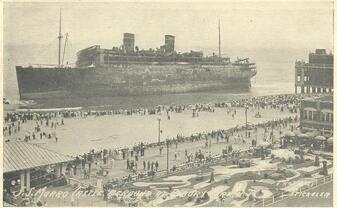
On September 8 of 1934
The ocean liner SS Morro Castle headed for New York from Havana catches fire in the Atlantic, losing its engines and drifting to the beach near the Asbury Park Convention Hall. The fire, whose cause was never conclusively determined, results in the deaths of 137 passengers and crew members.
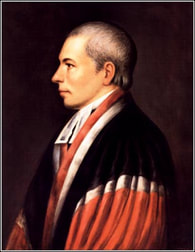
On September 9 of 1806
William Paterson, justice of the US Supreme Court appointed by President George Washington and former New Jersey Governor, Chancellor, Attorney General and US Senator, dies at the age of sixty. Paterson's father Richard had brought his family to America from Ireland in 1747 and after working as a traveling peddler of household goods, was able to purchase a general store in Princeton along the main road from New York to Philadelphia and across from Nassau Hall, which became the site of the College of New Jersey (now Princeton University). William enrolled in the College in 1759 at the age of 14, and after graduation became a prominent attorney who was selected as a delegate for the first three provincial congresses of New Jersey, where, as secretary, he helped write the 1776 State Constitution. As a delegate to the 1787 Philadelphia Convention in Philadelphia, he proposed the New Jersey Plan for a unicameral legislative body with equal representation from each state, which formed the basis of the Great Compromise for two legislative bodies: a Senate with equal representation for each state, and a House of Representatives with representation based on population. In 1793, he resigned his seat in the Senate to accept appointment to the Supreme Court, on which he served until his death in 1806.
William Paterson, justice of the US Supreme Court appointed by President George Washington and former New Jersey Governor, Chancellor, Attorney General and US Senator, dies at the age of sixty. Paterson's father Richard had brought his family to America from Ireland in 1747 and after working as a traveling peddler of household goods, was able to purchase a general store in Princeton along the main road from New York to Philadelphia and across from Nassau Hall, which became the site of the College of New Jersey (now Princeton University). William enrolled in the College in 1759 at the age of 14, and after graduation became a prominent attorney who was selected as a delegate for the first three provincial congresses of New Jersey, where, as secretary, he helped write the 1776 State Constitution. As a delegate to the 1787 Philadelphia Convention in Philadelphia, he proposed the New Jersey Plan for a unicameral legislative body with equal representation from each state, which formed the basis of the Great Compromise for two legislative bodies: a Senate with equal representation for each state, and a House of Representatives with representation based on population. In 1793, he resigned his seat in the Senate to accept appointment to the Supreme Court, on which he served until his death in 1806.
On September 10 of 1955
Bert Parks begins a 25-year run as host of the "Miss America Pageant" broadcast by NBC from Atlantic City.
Bert Parks begins a 25-year run as host of the "Miss America Pageant" broadcast by NBC from Atlantic City.
On September 11 of 2001
Four airliners are hijacked by 19 al-Qaeda terrorists, with 694 New Jersey residents killed of the total 2,996 dying in the attacks by hijackers who crashed airplanes into the World Trade center's twin towers and the Pentagon, as well as the crash of a fourth hijacked plane, which had taken off from Newark Liberty International Airport bound for San Francisco, but which crashed in a field near Shanksville in Somerset County, Pennsylvania, after passengers—learning of the earlier hijackings over cellular phones-- attempted to overpower the hijackers and retake control of the plane. Middletown Township in Monmouth County had 37 residents die in the World Trade Center attacks, more victims per capita than any other place in the state and the second hardest hit city after New York. In November 2002, President George W. Bush appointed former New Jersey Governor Thomas H. Kean to chair The National Commission on Terrorist Attacks Upon the United States (popularly known as the 9/11 Commission) created by Congressional legislation to investigate the attacks, which in 2004 issued a report pointing to failures of the CIA and FBI to share information on suspects they had identified as potential terrorists and recommended reforms in how federal agencies were structured to improve coordination of intelligence probes.
Four airliners are hijacked by 19 al-Qaeda terrorists, with 694 New Jersey residents killed of the total 2,996 dying in the attacks by hijackers who crashed airplanes into the World Trade center's twin towers and the Pentagon, as well as the crash of a fourth hijacked plane, which had taken off from Newark Liberty International Airport bound for San Francisco, but which crashed in a field near Shanksville in Somerset County, Pennsylvania, after passengers—learning of the earlier hijackings over cellular phones-- attempted to overpower the hijackers and retake control of the plane. Middletown Township in Monmouth County had 37 residents die in the World Trade Center attacks, more victims per capita than any other place in the state and the second hardest hit city after New York. In November 2002, President George W. Bush appointed former New Jersey Governor Thomas H. Kean to chair The National Commission on Terrorist Attacks Upon the United States (popularly known as the 9/11 Commission) created by Congressional legislation to investigate the attacks, which in 2004 issued a report pointing to failures of the CIA and FBI to share information on suspects they had identified as potential terrorists and recommended reforms in how federal agencies were structured to improve coordination of intelligence probes.
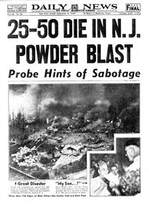
On September 12 of 1940
An explosion of nearly 300,000 pounds of gunpowder kills 51 workers and injures over 200 at the Hercules Powder Co. plant in the Kenvil section of Roxbury Township in Morris County
An explosion of nearly 300,000 pounds of gunpowder kills 51 workers and injures over 200 at the Hercules Powder Co. plant in the Kenvil section of Roxbury Township in Morris County
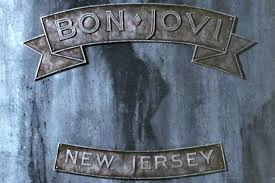
On September 13 of 1988
The rock band Bon Jovi releases their fourth album, named after their home state, New Jersey
On September 13 of 1776
William Livingston, elected as New Jersey's first state governor following the Declaration of Independence, gives his inaugural speech to the legislature, reflecting on the path the state had taken, contrasting independence against the “long … system of despotism concerted for our ruin … and … attempted to be enforced by the violence of war.”
The rock band Bon Jovi releases their fourth album, named after their home state, New Jersey
On September 13 of 1776
William Livingston, elected as New Jersey's first state governor following the Declaration of Independence, gives his inaugural speech to the legislature, reflecting on the path the state had taken, contrasting independence against the “long … system of despotism concerted for our ruin … and … attempted to be enforced by the violence of war.”
On September 14 of 1944
"The Great Atlantic Hurricane of 1944" results in nine deaths and injuries to another 390 people in New Jersey, along with 400 homes destroyed and damages to more than 3,000 others.
"The Great Atlantic Hurricane of 1944" results in nine deaths and injuries to another 390 people in New Jersey, along with 400 homes destroyed and damages to more than 3,000 others.
On September 15 of 1958
A Central Railroad of New Jersey commuter train runs through an open drawbridge near Bayonne, with the locomotive and leading cars plunging into Newark Bay, killing 48, including former New York Yankees second baseman George "Snuffy" Stirnweiss
A Central Railroad of New Jersey commuter train runs through an open drawbridge near Bayonne, with the locomotive and leading cars plunging into Newark Bay, killing 48, including former New York Yankees second baseman George "Snuffy" Stirnweiss
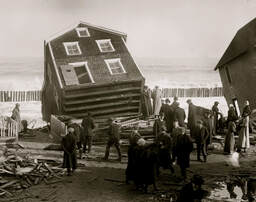
On September 16 of 1903
The 1903 New Jersey hurricane, also known as the "Vagabond Hurricane," is the first and only known Atlantic hurricane to make landfall in New Jersey since records were kept starting in 1851. The storm causes extensive damage, destroying hotels, homes, boardwalks and stores in Atlantic City, Asbury Park and other shore resorts.
The 1903 New Jersey hurricane, also known as the "Vagabond Hurricane," is the first and only known Atlantic hurricane to make landfall in New Jersey since records were kept starting in 1851. The storm causes extensive damage, destroying hotels, homes, boardwalks and stores in Atlantic City, Asbury Park and other shore resorts.
On September 17 of 2016
A pipe bomb bomb explodes in a trash can in Seaside Park, followed later that day by explosion of a homemade pressure cooker bomb in the Chelsea neighborhood of Manhattan. Thirty-one people are injured in the Manhattan bombing. Two days later, Ahmad Khan Rahami, a 28-year-old Afghan man and naturalized US citizen whose family operated a takeout restaurant in Elizabeth, is arrested in Linden; he subsequently was tried, convicted and sentenced on February 13, 2018, to life in prison without parole.
A pipe bomb bomb explodes in a trash can in Seaside Park, followed later that day by explosion of a homemade pressure cooker bomb in the Chelsea neighborhood of Manhattan. Thirty-one people are injured in the Manhattan bombing. Two days later, Ahmad Khan Rahami, a 28-year-old Afghan man and naturalized US citizen whose family operated a takeout restaurant in Elizabeth, is arrested in Linden; he subsequently was tried, convicted and sentenced on February 13, 2018, to life in prison without parole.
|
On September 18 of 2001
Letters tainted with anthrax with Trenton postmarks on this date, but believed to have been mailed from Princeton, are sent to: ABC News, CBS News, NBC News and the New York Post in New York City and to the National Enquirer in Boca Raton, Florida. Subsequent tainted letters also bearing Trenton postmarks dated October 9 are addressed to two Democratic Senators, Tom Daschle of South Dakota and Patrick Leahy of Vermont. At least 22 people developed anthrax infections, with five deaths attributed to inhalation of the poison. Investigations fail to conclusively identify the perpetrator, although the FBI identified Bruce Ivins, an Anthrax researcher employed at Army labs in Maryland, as the principal suspect, with Ivins committing suicide in 2008. |
|
|
On September 19 of 1881
James A. Garfield, the 20th President of the United States, dies in Elberon at the age of 49 after being shot on July 2 by disappointed job-seeker Charles J. Guiteau at the Baltimore and Potomac Railroad Station in Washington, DC. Garfield had been taken by train on September 6 from Washington to a beachfront home in Elberon in an effort to aid his recovery. |
On September 20 of 1881
Chester A. Arthur, after being sworn in as president at his apartment in New York City after being notified of the death on the night before of President James A. Garfield, stops in Elberon to pay his respects to Garfield's widow and family on his way to Washington.
On September 21 of 1927
New Jersey Governor A. Harry Moore and New York Governor Al Smith join in groundbreaking ceremony for construction of a bridge across the Hudson River which later would be named the George Washington Bridge
New Jersey Governor A. Harry Moore and New York Governor Al Smith join in groundbreaking ceremony for construction of a bridge across the Hudson River which later would be named the George Washington Bridge
|
On September 22 of 2023
The US Attorney for the Southern District of New York issues an indictment against US Senator Bob Menendez, a Democrat and New Jersey’s senior senator, and his wife, Nadine Menendez, on charges of accepting hundreds of thousands of dollars in bribes in exchange for official favors meant to aid three men--Wael Hana, Jose Uribe, and Fred Daibes--and the nation of Egypt in a conspiracy to help Daibes, a North Jersey businessman and real estate developer. On October 12, the US Attorney releases a superseding indictment accusing the senator of acting as a foreign agent for Egypt while serving as chair of the Senate Foreign Relations Committee, using his power as the committee’s chair to speed billions in military aid to Egypt that had been denied in prior years over the country’s controversial record of human rights violations and that the senator’s wife and Wael Hana arranged a series of meetings with Egyptian officials and they later acted as conduits between the senator and the officials. |
|
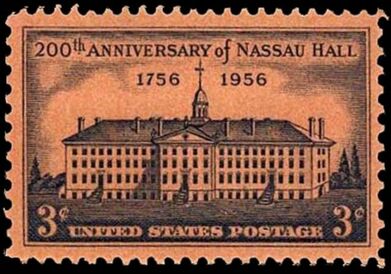
On September 22 of 1956
US Postal Service issues stamp commemorating 200th anniversary of completion in 1756 of Nassau Hall at then College of New Jersey (now Princeton), at the time largest stone building in the colonies
US Postal Service issues stamp commemorating 200th anniversary of completion in 1756 of Nassau Hall at then College of New Jersey (now Princeton), at the time largest stone building in the colonies
|
On September 23 of 1949
Bruce Springsteen, first child of Adele and Douglas Springsteen, is born at Monmouth Medical Center in Long Branch |
|
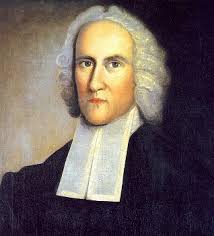
On September 24 of 1757
Aaron Burr Sr., second president of the College of New Jersey (renamed Princeton University in 1896) and father of future vice president Aaron Burr, Jr., dies in Princeton at age 41 after leading the College since 1748. Seven months after his death, his widow Esther dies, orphaning their three-year-old daughter Sarah and two-year-old son Aaron.
On September 25 of 1975
41-year-old singer Jackie Wilson suffers a heart attack while performing at the Latin Casino in Cherry Hill in the middle of singing one of his biggest hits, "Lonely Teardrops." He collapses to the stage, striking his head heavily, suffering brain damage and lapsing into a coma from which he never regained consciousness until his death over eight years later on January 21, 1984.
41-year-old singer Jackie Wilson suffers a heart attack while performing at the Latin Casino in Cherry Hill in the middle of singing one of his biggest hits, "Lonely Teardrops." He collapses to the stage, striking his head heavily, suffering brain damage and lapsing into a coma from which he never regained consciousness until his death over eight years later on January 21, 1984.
On September 25 of 2022
Former Governor James J. Florio dies at the age of 85. Florio, a former amateur boxer and Navy officer, served eight terms in Congress representing a South Jersey district including the City of Camden, where he authored the federal Superfund law modeled on earlier state legislation to clean up polluted sites. As governor from 1990-94, he faced strong opposition as he successfully advocated laws to enact a statewide ban on semi-automatic weapons, increase the sales and income taxes to raise $2.6 billion meet a funding shortfall and revamp the state’s school funding system to send more money to the poorest districts. He was defeated for re-election by Republican Christine Todd Whitman in 1993.
Former Governor James J. Florio dies at the age of 85. Florio, a former amateur boxer and Navy officer, served eight terms in Congress representing a South Jersey district including the City of Camden, where he authored the federal Superfund law modeled on earlier state legislation to clean up polluted sites. As governor from 1990-94, he faced strong opposition as he successfully advocated laws to enact a statewide ban on semi-automatic weapons, increase the sales and income taxes to raise $2.6 billion meet a funding shortfall and revamp the state’s school funding system to send more money to the poorest districts. He was defeated for re-election by Republican Christine Todd Whitman in 1993.
On September 26 of 1892
John Philip Sousa and the 60-piece U.S. Marine Band perform the "Liberty Bell March" at the Stillman Music Hall in Plainfield
On September 27 of 1942
Glenn Miller, a resident of Teaneck, and his Orchestra perform together for the last time in the US, at the Central Theater in Passaic, prior to Miller's joining the Army as a volunteer to entertain the troops conducting an Army band. On December 15, 1944, his plane disappears over the English Channel on a trip to Paris and he and two others aboard are never found.
|
On September 28 of 1778
In what would become known as the "Baylor Massacre," the British launch a surprise attack on Continental soldiers under the command of Colonel George Baylor in the present-day town of River Vale in Bergen County. The Continentals lost 69 soldiers killed, wounded, or captured, with only one British soldier killed. In 1967, the remains of six of the dead—recognized from artifacts such as buttons and clothing remnants—were found in three abandoned vats from Blauvelt's Tannery. In 1972, facing suburban development, the site was dedicated as a county park and the remains re-interred there. |
|
On September 28 of 2021
New Jersey passed more than 1 million confirmed cases of COVID-19 since the Pandemic first reached the state in 2020.
New Jersey passed more than 1 million confirmed cases of COVID-19 since the Pandemic first reached the state in 2020.
On September 29 of 2016
A NJ Transit commuter train crashes as it enters Hoboken Terminal in Hoboken, killing a woman waiting on the platform hit with falling debris and injuring 114 others.
A NJ Transit commuter train crashes as it enters Hoboken Terminal in Hoboken, killing a woman waiting on the platform hit with falling debris and injuring 114 others.
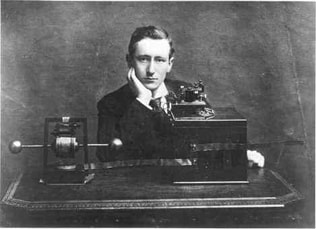
On September 30 of 1899
Gugielmo Marconi, a 25-year-old Italian inventor and electrical engineer, transmits the first wireless message from a ship at sea to land, with the message received at towers he had erected at the Twin Lights in Highlands. Marconi's message reports the sighting of the Naval fleet commanded by Commodore George Dewey, which was returning from the Pacific after its victory over the Spanish in the Battle of Manila Bay in the Spanish-American War. Marconi later establishes a transatlantic overseas reception station in Wall Township.
Gugielmo Marconi, a 25-year-old Italian inventor and electrical engineer, transmits the first wireless message from a ship at sea to land, with the message received at towers he had erected at the Twin Lights in Highlands. Marconi's message reports the sighting of the Naval fleet commanded by Commodore George Dewey, which was returning from the Pacific after its victory over the Spanish in the Battle of Manila Bay in the Spanish-American War. Marconi later establishes a transatlantic overseas reception station in Wall Township.
